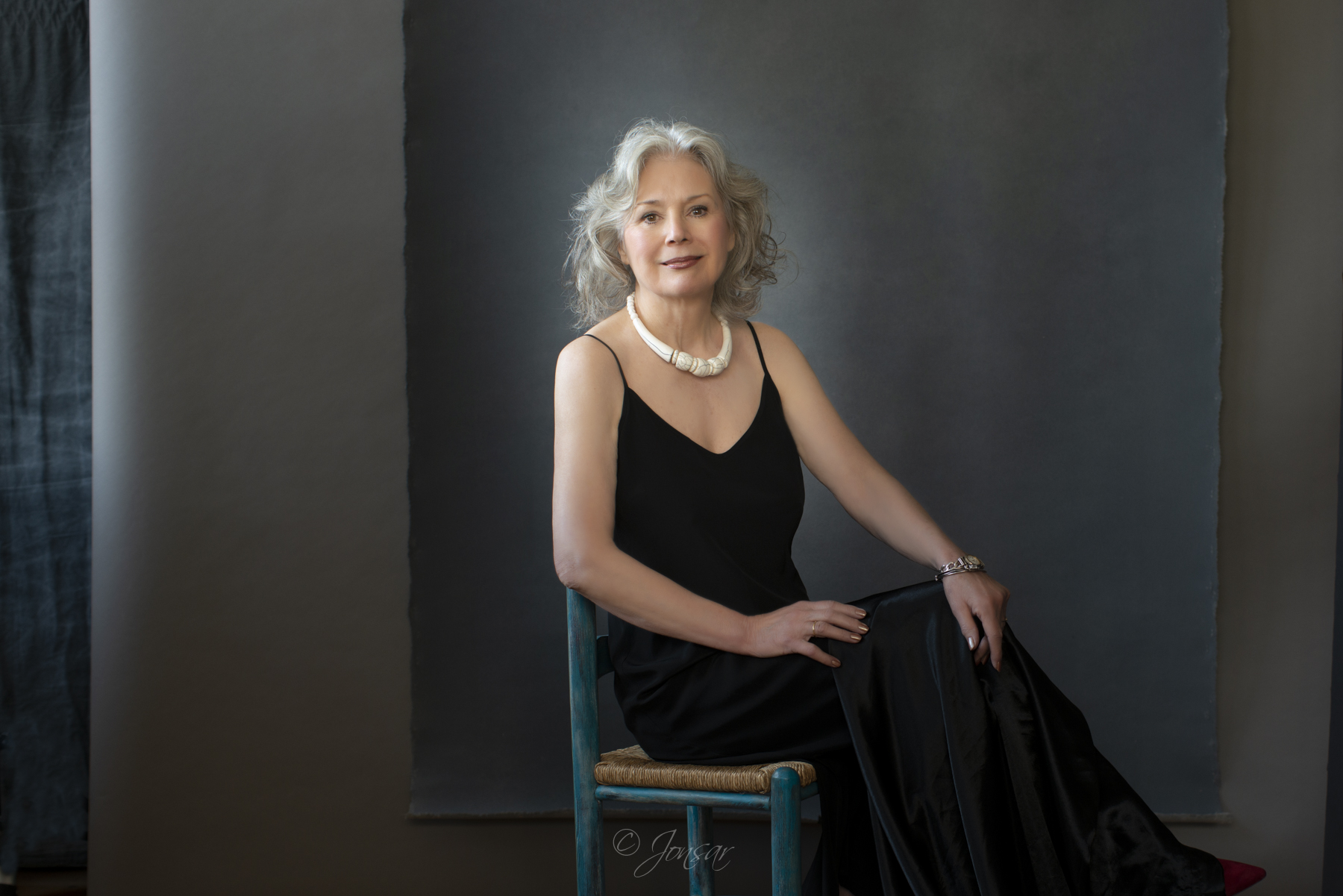Kathryn Leigh Scott -Conversations with Artists
What is the art of what you do?
I give a voice to feelings. My twin careers have always been acting and writing and they give me that opportunity. I wrote a book called "The Bunny Years" for which I interviewed some 300 women. It was about the 25-year history of the Playboy Clubs. I felt that I was giving each woman a voice to speak about something that people had so many ideas about but actually knew little. I find that also happens with the mystery books that I write and it’s something that really intrigued me about acting. It's finding the voice and giving room for others’ voices.
How do you give voice to others?
By getting inside a character — the character that I interpret and in which I find truth. Finding the essence of the truth of a character is fascinating to me.
How do you do that when you're interviewing somebody?
I help them relax so that they can just talk to me. I was able to do that with the Bunnies that I interviewed and also when I was writing my caregiving books. People felt comfortable enough to share the kinds of things that were hard for them to face themselves. It’s not easy to talk about getting impatient and sometimes angry when you’re caregiving. It’s about making someone comfortable enough that they're willing to share those things and then not taking advantage of them — there’s a huge amount of trust involved.
Are you surprised you have that ability?
I was married to a photojournalist and I understood that he was chronicling things as they were. That intrigued me. That was his heart and I also understood that it was part of my art -- to bring out things as they are.
What made you write about caregiving?
I cared for my husband who had Progressive Supra-Nuclear Palsy. PSP is in the family of ‘prime of life diseases’ -- a disease that strikes when you're in the prime of your life. Diseases like ALS and Lewy Body Dementia which is what Robin Williams had -- PSP is one of those. You are trapped inside a body that is betraying you. Even though your mind is sharp, very often right up until the end, you lose your mobility -- your ability to swallow, the ability to breathe. I learned a great deal caring for somebody going through that long period of transition. Among the things I learned was patience. The doctor that diagnosed my husband suggested I keep a journal and when my husband passed away I realized I had the template for a book in my journal. I decided to share it.
That's really opening yourself up!
It is because I wrote very honestly, and now I do public speaking on caregiving. There are things that you should talk to a doctor about but if you want ‘the straight dope’ on caregiving you go to somebody who's been a caregiver.
When you’re in the end-game with a loved one, it’s a summing up. I say that hospice isn't end-of-life care it's quality of life care because you're alive until that moment. Easing somebody into that transition and being there is something I understand.
So how does a girl go from a farm in Minnesota to Dark Shadows?
That was not a torturous route. I loved the farm but I catapulted to New York because I really wanted to be an actor. I got a scholarship at the American Academy of Dramatic Arts and to pay my room and board I was a Playboy Bunny - which I loved. The Bunny dressing room circa 1964 had more diversity than you would find on any college campus 10 years later. There were women of every size and shape and hue, from every part of the world. There were a 110 of us and everybody was different. We had heiresses and girls from the tenements. There was also a huge sense of accomplishment when you could carry a heavy tray and make everybody happy and give them the drink that they wanted. There was something wonderful about that — and also the fact that I was paying for myself; I wasn't asking for money from my dad. I put myself through school, I was self-sufficient. I auditioned for Dark Shadows and got the job. I thought everything would forever be that easy. It was a wonderful experience. I was working among a group of actors, just as I worked among a group of Bunnies. There wasn't a day that I didn't find joy in going to work. The first director I ever worked with was a woman and she was so accomplished. She came out of live television in the golden era and I thought ‘wow women direct!’ It was 20 years before I worked with another woman director. So Dark Shadows was really very special. Creating four different characters from scratch in four different time periods using everything that I had learned in acting class: Shakespeare, restoration comedy, Ibsen - it all came together in Dark Shadows.
Did you realize the impact that you were having on a generation at that point?
All I knew even at the time is that it was something special, but I didn’t realize just how far-reaching it was.
I can't tell you how many letters I get saying “You helped me get through a terrible childhood.” or “My best childhood memories are sitting on the couch with my grandmother watching Dark Shadows.” or “My father was an alcoholic and your character showed me the way.” The other thing is our show was really about outsiders. The ultimate outsider is a vampire. I think kids gravitated towards that because no matter what awful thing happened in school that day, they weren't attacked by a vampire. They would come home and lose themselves in a fantasy. Again it goes back to the idea of giving voice to feelings.
To live an artist's life is not for the faint of heart. Did you set out to live that kind of life?
I think that I did. My father was a farmer, my mother was a school cook and caterer, but both of them found artistry in their everyday lives. There was artistry in the way that my mother arranged food or flowers, in the way my father sowed the fields. There was artistry in the care that my father put into growing berries and two kinds of cabbages, three kinds of beans. It's creating an environment that pleases the eye, that nourishes the soul.
Have you ever watched the guy in Grand Central Station shine shoes? The way he slaps that cloth around and how he uses his fingers to get the polish on, the way he spits on his fingers and rubs it on the heels - there’s artistry in that. His fingers fly and every shoe is different.
Tell us about the Pomegranate Press.
I was doing a lot of writing - magazine articles, etc., but then two good friends from Dark Shadows, Joel Crothers and Grayson Hall passed away within about 6 months of each other. A magazine asked me to write a profile on Joel who played my boyfriend and I started writing the profile and I just kept writing and writing and it all came flooding back. This was a good 15 years after the show had been off the air. I put pencil to yellow legal paper and I just filled pad after pad. Then I decided to publish it myself because I knew how to reach the audience. The idea of physically making a book appealed to me. So I really learned from scratch. I started my company with $10 and I just slowly put it all together. I poured the money I made back into the company and I published four books by other people the following year. I simply loved publishing. I loved being able to choose the cover material, working with graphic designers. I love typography. I literally love the process of putting the book together and then marketing it, putting it into a jiffy bag and sending it out for review. I realized how close it was to what my father did. This was essentially farming; a series of small jobs that at the end of the day you take to market.
How do you find your own personal happiness when times are stressful?
I so dislike being unhappy that I can’t stay unhappy for very long. Even when my husband was very ill there was still joy to be had -- making him a malted milk and seeing how much pleasure it gave him. It's finding something that makes you feel better about what's happening and better about yourself.
If you could go back to 10-year-old you on the farm and whisper some advice into your own ear, what would you say?
Follow your dream. Don’t let anything get in the way.
Would you say you’ve done that for the most part?
I think that I have. I always found a way. I think my primary career would have been writing but I got work as an actor so that’s the direction I went in.
You said you feel like celebrating. Why?
I turned 75 and if I can still be doing the things that I loved doing when I was 25, what's better than that? I'm still making movies, I'm still writing books, if I can do all of that at 75, that's pretty terrific. I’ve accepted that I’m growing older. As my husband used to say ‘consider the alternative.’ So it's wonderful that I can keep doing what I love, and I am feeling celebratory about it.
To learn more about Kathryn Leigh Scott visit her website.








